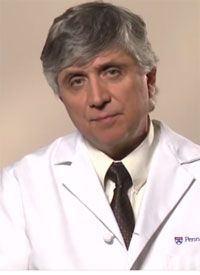Novel Bispecific Antibody Yields Responses in Aggressive or Indolent NHL
In an interview with Targeted Oncology, Stephen J. Schuster, MD, discussed the findings for mosunetuzumab in patients with relapsed/refractory non-Hodgkin lymphoma and the particularly promising findings for those patients who had received prior chimeric antigen receptor T-cell therapy.
Stephen J. Schuster, MD

Stephen J. Schuster, MD
Mosunetuzumab, a novel bispecific antibody, induced complete remissions in more than 20% of patients with heavily-pretreated relapsed/refractory non-Hodgkin lymphomas (NHL) who had received prior chimeric antigen receptor (CAR) T-cell therapy in the phase I/Ib dose-escalation GO29781 trial (NCT02500407).
The objective response rate (ORR) in patients with aggressive NHL was 37.1% with 19.4% of patients achieving a complete response (CR). In patients with indolent NHL, the ORR was 62.7%, including 43.3% with a CR. In patients who had received prior CAR T-cell therapy, the ORR was 38.9% with a 22.2% CR rate.
Cytokine release syndrome (CRS) of any grade occurred in 28.9% of patients overall, whereas CRS was observed in 26.7% of patients in the cohort that had previously received CAR T-cell therapy. Most adverse events (AEs) were grades 1 or 2. Three patients experienced grade 3 CRS including 1 patient from the CAR T-cell therapy cohort. Neurological AEs were reported in 43.7% of patients overall versus 43.3% in the CAR T-cell therapy cohort; grade 3 neurological AEs occurred in 3.7% and 10.0% of patients, respectively.
The study remains ongoing and will evaluate safety and efficacy after longer follow-up.These data were most recently presentedat the 2019 American Society of Hematology Annual Meeting.
In an interview withTargeted Oncology,Stephen J. Schuster, MD, director of the lymphoma program at Abramson Cancer Center at the University of Pennsylvania, discussed the findings for mosunetuzumab in patients with relapsed/refractory NHL and the particularly promising findings for those patients who had received prior CAR T-cell therapy. He highlighted next steps for this research.
TARGETED ONCOLOGY: What is the rationale for evaluatingmosunetuzumab in this patient population?
Schuster:There remains an unmet need for new drugs for patients with B-cell lymphomas. That is across the board, including large B-cell lymphomas, aggressive NHLs, and indolent NHLs, despite all the advances we have had in therapies over recent years. That is the rationale for this study.
This agent is a new bispecific T-engaging antibody that binds to CD20 on B cells and CD3 on T cells. It’s a form of indirect cellular therapy, getting the T cells to irradiate the B cells. The study population was comprised of patients with large B-cell lymphomas, mostly diffuse large B-cell lymphoma (DLBCL) but also some patients with follicular lymphoma (FL) or mantle cell lymphoma. These are the aggressive lymphomas, and the other part of the population were the indolent lymphomas, although they were by no means indolent by this stage; these were largely patients with FL.
The study design was a schedule optimizing dose-escalation study in a phase I looking primarily for tolerability, toxicities, maximum tolerated dose, and the usual phase I characteristics. Nowadays, we always look at efficacy regardless of the phase of study, so we are also looking at objective responses.
TARGETED ONCOLOGY: What were the findings?
Schuster:We found objective responses in both aggressive and indolent lymphomas across the board and across doses tested. What was the most remarkable thing, which I think is the reason this trial has gotten so much attention at this meeting, is patients who had received CAR T-cell therapy but were not responding were able to be rescued in many cases with this drug. We saw similar response rates in patients who had prior CAR T-cell therapy and similar response rates to those with aggressive lymphomas who had not had prior CAR T-cell therapy.
TARGETED ONCOLOGY:Were you surprised by any of the findings?
Schuster:The most unexpected finding in this trial was that the patients with prior CAR T-cell therapies faired as well as the patients who hadn’t received CAR T-cell therapy. That was a shocker. The median number of prior therapies in that group was 5, so they were a much worse group in terms of prognosis than the average group.
The other thing is that some of the patients who had prior CAR T-cell therapy had re-expansion of the CAR T cells with the bispecific, so that was another surprise. It was not all [patients] but some.
TARGETED ONCOLOGY: Do these patients have high-risk features?
Schuster:These patients had high-risk features becuase they were relapsed/refractory or resistant to therapy. The median number of prior therapies is 3, and the majority of patients had an anti-CD20 monoclonal antibody and a chemotherapeutic agent within 6 months of enrollment, meaning failing that approach within 6 months to be eligible for this study.
This was a study for patients who didn’t have a lot of good treatment options, and it’s the type of population that we used when we were developing CAR T-cell therapy for B-cell lymphomas, patients who do not have commercially available or standard of care therapeutic options.
TARGETED ONCOLOGY:What are the next steps?
Schuster:
Examining the Non-Hodgkin Lymphoma Treatment Paradigm
July 15th 2022In season 3, episode 6 of Targeted Talks, Yazan Samhouri, MD, discusses the exciting new agents for the treatment of non-Hodgkin lymphoma, the clinical trials that support their use, and hopes for the future of treatment.
Listen